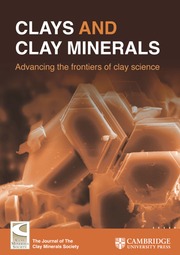Article contents
Serpentine-nontronite-vermiculite mixed-layer clay from the Weches Formation, Claiborne Group, middle Eocene, northeast Texas
Published online by Cambridge University Press: 01 January 2024
Abstract
The Weches Formation of the Claiborne Group (Eocene) in northeast Texas consists of clayey sandstones and mudrocks, both with variable proportions of dark green to brown clay peloids deposited in a marginal to open marine setting on the Gulf Coast margin. The composition of the dark green peloids, from two localities, has been investigated using X-ray diffraction, back-scattered electron microscopy with X-ray analysis, electron energy-loss spectroscopy (EELS), Mössbauer spectroscopy, chemical analysis and Fourier transform infrared spectroscopy. These peloids were previously described on the basis of their color as glauconite (Yancey and Davidoff, 1994); our results, however, show that the dark green indurated pellets are predominantly composed of mixed-layer clays with a high proportion of Fe-rich 7 Å serpentine layers coexisting with a mixed-layer phase containing glauconite, nontronite and vermiculite layers, in addition to discrete illite and kaolinte. Analyses by EELS of single particles with a chemical composition consistent with them being the Fe-rich clay indicate that the Fe is >95% ferric, while Mössbauer analyses of the bulk magnetically separated fraction for the same samples indicates a ferric iron content of ∼60–70%, despite the variable relative proportions of expandable and 7 Å layers. Taking into account that there is a significant amount of 2:1 layers containing ferric Fe, we interpret these data as indicating that the Fe in the 7 Å layers has a significant amount of Fe2+ even taking into account the high ferric Fe ratio from the EELS analysis when the coexisting 2:1 layers are considered. Thus, these 1:1 layers are closer to berthierine in composition than to odinite. The vermiculite layers in the Texas clay may indicate partial ‘verdinization’ of expandable 2:1 clay. A possible reaction is smectite → vermiculite → berthierine-like phase. We estimate a temperature of 20°C for the seawater in which the Texas clay formed, the lower end of the range for modern occurrences of odinite.
Keywords
- Type
- Research Article
- Information
- Copyright
- Copyright © 2006, The Clay Minerals Society
References
- 10
- Cited by


